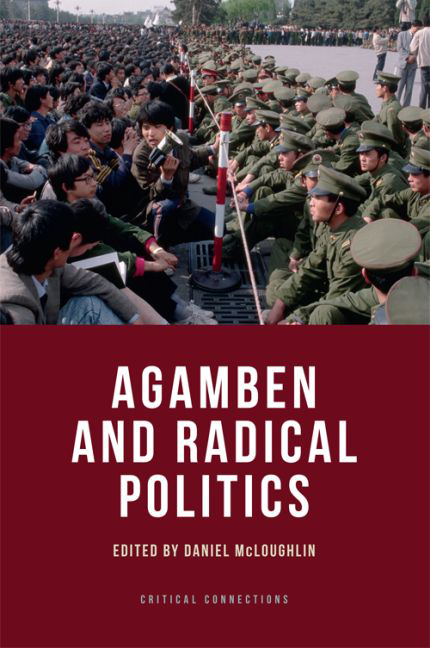Book contents
- Frontmatter
- Contents
- Acknowledgements
- Introduction: Agamben and Radical Politics
- 1 Capitalism as Religion
- 2 Glory, Spectacle and Inoperativity: Agamben's Praxis of Theoria
- 3 On Property and the Philosophy of Poverty: Agamben and Anarchism
- 4 ‘Man Produces Universally’: Praxis and Production in Agamben and Marx
- 5 Liturgical Labour: Agamben on the Post-Fordist Spectacle
- 6 An Alogical Space of Genetic Reintrication: Notes on an Element of Giorgio Agamben's Method
- 7 Zoē aiōniōs: Giorgio Agamben and the Critique of Katechontic Time
- 8 Agamben, Badiou and Affirmative Biopolitics
- 9 Form-of-Life and Antagonism: On Homo Sacer and Operaismo
- 10 What Is a Form-of-Life?: Giorgio Agamben and the Practice of Poverty
- 11 Law and Life beyond Incorporation: Agamben, Highest Poverty and the Papal Legal Revolution
- Notes on Contributors
- Index
11 - Law and Life beyond Incorporation: Agamben, Highest Poverty and the Papal Legal Revolution
Published online by Cambridge University Press: 23 September 2017
- Frontmatter
- Contents
- Acknowledgements
- Introduction: Agamben and Radical Politics
- 1 Capitalism as Religion
- 2 Glory, Spectacle and Inoperativity: Agamben's Praxis of Theoria
- 3 On Property and the Philosophy of Poverty: Agamben and Anarchism
- 4 ‘Man Produces Universally’: Praxis and Production in Agamben and Marx
- 5 Liturgical Labour: Agamben on the Post-Fordist Spectacle
- 6 An Alogical Space of Genetic Reintrication: Notes on an Element of Giorgio Agamben's Method
- 7 Zoē aiōniōs: Giorgio Agamben and the Critique of Katechontic Time
- 8 Agamben, Badiou and Affirmative Biopolitics
- 9 Form-of-Life and Antagonism: On Homo Sacer and Operaismo
- 10 What Is a Form-of-Life?: Giorgio Agamben and the Practice of Poverty
- 11 Law and Life beyond Incorporation: Agamben, Highest Poverty and the Papal Legal Revolution
- Notes on Contributors
- Index
Summary
One of the central concerns of Agamben's Homo Sacer project is to identify the traits of a life that escapes being captured by law. The Highest Poverty: Monastic Rules and Form-of-Life provides one of the most sustained treatments of this problem by arguing that the Franciscan movement offers the first exemplar of an extra-juridical ‘form-of-life’, at once rejecting the connection between law and life that characterises sovereignty, and developing a radically anti-consumerist relation to the world. According to Agamben, the Franciscan ideal of giving up on all ownership (designated as ‘highest poverty’) radically calls into question the internal relation between having ownership over things (dominium) and being a subject of rights (sui iuris) in the tradition of Roman law. Against the background of this principle of Roman law, it becomes conceivable that a form of life in which individuals own nothing would be equivalent to a form-of-life that has escaped capture from law.
This chapter reconstructs and problematises Agamben's account of form-of-life and its emancipatory potential in The Highest Poverty by situating it within the context of the ‘papal legal revolution’ of the twelfth and thirteenth centuries. The Franciscan movement coincides with a moment of profound jurisprudential innovation, when Roman law is recovered and reinterpreted in light of both of Trinitarian theology and Aristotelian naturalism, in order to serve as the ultimate weapon in the ‘global civil war’ of Western Christendom between the Papacy and the Holy Roman Empire. Recent research on the papal legal revolution indicates that this recovery of Roman law had the unintended consequence of establishing the conditions for the emergence of modern capitalism and of the modern nation-state that together would bring to an end both ecclesiastical and imperial claims to ‘universal dominium’. The conflict between the Franciscan monastic order and the hierocratic designs of the Papacy gave a new form to Roman private law that sealed the connection between property and right by inventing the subjective and natural right to private property. Likewise, canon law and the civilian commentaries to the Corpus Iuris Civilis brought about fundamental innovations in public law, above all, by introducing the idea that groups and associations become capable of acting collectively by being incorporated through a fictional legal personality whose ultimate representative is the sovereign.
- Type
- Chapter
- Information
- Agamben and Radical Politics , pp. 234 - 262Publisher: Edinburgh University PressPrint publication year: 2016



